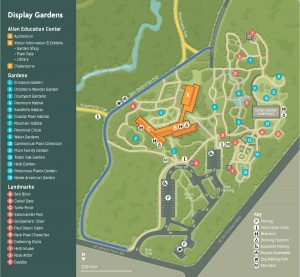A Conservation Garden

North Carolina is home to an amazingly rich flora, including many plant species found nowhere else in the world. For more than half a century, the North Carolina Botanical Garden has been dedicated to conserving that unique botanical legacy. Today, we cultivate more than 1,100 acres of garden and conservation areas, safeguard rare and endangered plant species from extinction, and educate new generations of plant lovers and environmental citizens.
This is much more than a display garden. It is a robust ecosystem where people can discover the natural world, experience its healing and restorative power, and understand why conservation is critical to our quality of life. Year-round native plant gardening makes for a unique and beautiful landscape, from the tiny ephemerals that pop up in early spring to the stunning, architectural seed heads of fall. Whichever season you find yourself here, we hope you enjoy our conservation garden!
Display Gardens
James & Delight Allen Education Center
Piedmont Nature Trails
Garden Etiquette
- Leashed pets are allowed on the Piedmont Nature Trails. With the exception of service animals, no pets are allowed within the Display Gardens.
- No smoking, e-cigarettes, or weapons allowed.
- Please park your bicycle in the provided bike racks.
- Pack out what you pack in. Picnics are permitted in the designated Picnic Area on the map and at the tables near our Daily Plant Sale pavilion. Please use designated recycling and trash bins. If you would like to reserve an outdoor space for a private picnic party or celebration, please contact our events team at ncbgevents@unc.edu to discuss options and rates.
- Please do not leave valuables within sight in your vehicle.
- We share this garden with many wild animals. Please be respectful of their space during your visit.
- Please respect our native plants. Do not pull, pick, or prod plants or stamp, stomp, or tromp in the garden displays.
Accessibility
The Allen Education Center and many of the Garden displays are wheelchair accessible. If you need special accommodations to enable your visit to the Garden, please let us know by calling 919-962-0522.
Marked accessible parking spaces can be found in the parking lot—several near the drop-off for the Education Center, and others closer to the Totten Center and original display gardens. If you require assistance in moving from a parking space to the building entrance, please call 919-962-0522 and tell us when to expect you; a member of the staff will be available to assist you.
Visitor Safety
The safety and well-being of our visitors, staff, and volunteers is the highest priority of the North Carolina Botanical Garden. Visitor Safety information can be found by clicking the Visitor Safety link in the page footer under Visit NCBG.